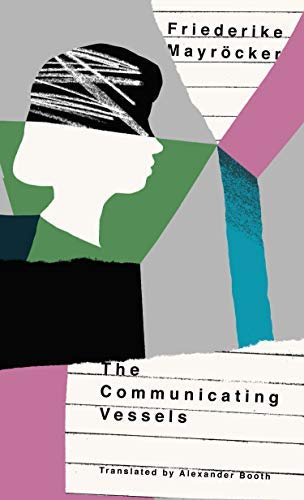Book Review: “The Communicating Vessels” — Incommunicado
By Kai Maristed
The late Friederike Mayröcker’s über-recognizable style has become a brand, logoed by certain objects: violets, lilacs, birds
The Communicating Vessels by Friederike Mayröcker. Translated from the German by Alexander Booth. A Public Space Books, 264 pages, $16.95.

Friederike Mayröcker, a grandissima dame of German poetry and letters, died this past spring in her beloved Vienna at the age of 95. Still penning (it is safe to say) critically acclaimed work, lastly, in 2020, da ich morgens und moosgrün. Ans Fenster trete, still expressing her desire to enjoy the joys and sorrows of life, and to write down her observations of birds and flowers, associations with other poets etc. (she likes to use ‘etc.’, so please forgive me), and barely revealed memories of moments with friends. In short, still exercising her desire always to express, sometimes with limpid directness, but often in hopscotching, disconnected images and thought-scraps. Up to the persistent patient reader to seek connection, or go with the babbling flow.
Unlike many of her poems, her most recent title in English, The Communicating Vessels, a double volume of prose superbly translated by Alexander Booth, definitely requires patience, and suspension of crass desire for any sort of, well, point, or purpose, other than to juxtapose over and over again her rage and sorrow at the loss of her lifetime partner, Ernst Jandl, with her everyday observations as she goes about the work of grieving and soothing herself through the act of writing…writing about just about anything that comes to mind. As she says.
By the way, in all these 254 pages of fragments often stuck together with ‘and’s, one glimpses almost nothing of the dead beloved, the poet Ernst Jandl. Instead, she quotes his praises for her work, for her very self-absorption, his encouragement, etc., and describes her distress over the marks and stages of his illness.
I plowed on, both in the English and German versions, through the author’s signature quirks of spelling and grammar. Her über-recognizable style has become a brand, logoed by certain objects: violets, lilacs, birds. Eventually I found myself thinking impatiently, you are not the only one to suffer pain, and the tweaking aches of old age, or to grieve a loved one. I am not engaged by the way you tell this. Your quotidian observations are often trite. Where is the gratitude for EJ and the rich decades? Needless to say, The Communicating Vessels has been welcomed everywhere with buzz and bowing and reviews from the literary elite that are even more mannered and repetitive than the text at hand.
Not to speak ill of the dead. Mayröcker’s poetry was tabu-breaking, won every prize imaginable, and can convey the translucent loveliness of things — objects and beings — apprehended in a moment. It rewards patience. I’m curious to read her bio of Gertrude Stein, and her children’s books too. But it takes a monstrous ego, I think, nurtured by a lifetime of awards and adulation, to utilize readers as vessels for self-absorbed outpourings that don’t communicate anything much that’s new.
Kai Maristed studied political philosophy in Germany, and now lives in Paris and Massachusetts. She has reviewed for the Los Angeles Times, the New York Times, and other papers. Her books include the short story collection Belong to Me, and Broken Ground, set in Berlin. Recent fiction includes Evangeline, or Theories of Childhood Development, in The Iowa Review, and The Age of Migration, in Ploughshares Magazine. Read Kai’s Paris-centric take on politics and the arts here.
